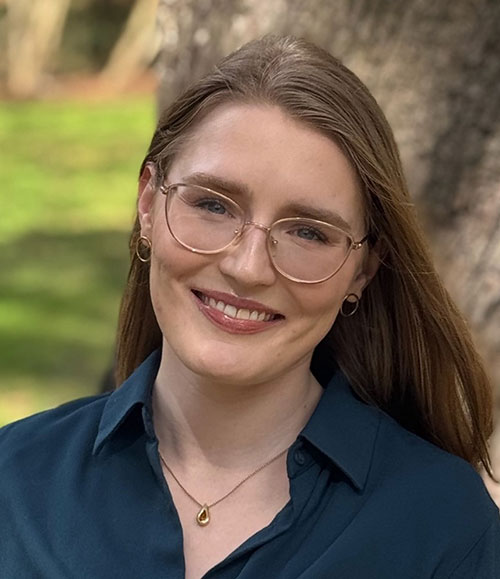Meet Elisabeth Silver, MSU’s New Organizational Psychologist
October 27, 2025 - Shelly DeJong
 The Michigan State University Psychology Department welcomes Elisabeth Silver as a new assistant professor in the organizational psychology research area.
The Michigan State University Psychology Department welcomes Elisabeth Silver as a new assistant professor in the organizational psychology research area.
Dr. Silver brings a unique background spanning biopsychology, computational methods, and workplace differences. Originally from the metro Detroit area and a University of Michigan graduate, she completed a research stint at Columbia University doing research on gastroenterology. After learning advanced computational and coding techniques and wanting to apply that to issues within the workplace, Dr. Silver then went on to earn her PhD in Industrial-Organizational Psychology at Rice University.
Dr. Silver met with me recently to talk about her journey to MSU, her research interests, and what she loves about being a researcher.
With a background in biopsychology, you went on to earn a PhD in I/O psychology. Why did you want to do research in Organizational Psychology?
We spend so much time at work. Most people who are fully employed spend 40 hours of their week at work, if not even more than that. So, it's really important that people have good experiences while they're there. Experiences that challenge them and help them excel and thrive. I wanted to contribute to this field and to policies that allow everybody to have access to these positive workplace experiences.
Today I do research that is founded in more traditional methods for organizational psychologists, like surveys and interviews, but the coding background has really helped me both in terms of how I approach the research and in terms of how able I am to communicate that research and make it accessible to other scientists. It's allowed me to be more open with my research and share things like the code and materials, in a way that's organized and hopefully easy for other people to understand.
What are your research interests?
Big picture, my research looks at how organizations and individual employees respond to changes in workplace demographics. That includes the dimensions we often think of—like race, culture, and gender—but also emerging forms of difference, such as neurodiversity, which refers to natural variation in how people think, feel, and behave. So broadly, I study both demographic change and these emerging differences in the workplace.
More specifically, my work focuses on how organizations try to adapt to demographic changes in ways that allow all employees to thrive and advance in their careers. Within that, I look closely at variability in people’s attitudes toward policies designed to promote equity. For example, I’m interested in how people form perceptions of policies aimed at encouraging fairness and inclusion, and how their broader views of demographic change shape their support for or resistance to those policies.
Can you give a few examples of what your research looks like?
One of my current projects looks at how people’s perceptions of historical inequalities relate to their attitudes toward contemporary policies that are connected to those same issues. Specifically, I’m conducting surveys and experiments to examine whether the way people think about the timing of major civil rights advances influences their willingness to support related policies today. The idea is that if someone sees a historical movement as having happened a very long time ago, they might feel that the issues it addressed are no longer relevant or worth working towards. On the other hand, if people see those events as more recent, they may feel more motivated to support ongoing efforts aligned with that cause.
Another line of my research focuses on neurodiversity, specifically the experiences of neurodivergent employees. By neurodivergent, I mean people who either have a clinical diagnosis or identify with a related label like autism, ADHD, or dyslexia. One project I’m especially excited about looks at how organizations attempt to recruit neurodivergent employees. There’s been a lot of writing recently about the unique strengths and skills neurodivergent employees can bring to the workplace, which can enrich organizations as a whole. But the challenge is: how can organizations actually get neurodivergent people to want to apply and work there?
To address that, I’m working on a project that examines how different kinds of organizational messaging are received by neurodivergent job applicants. We’re focusing on two main factors: the accommodations organizations are willing to provide during the hiring process, and how they frame neurodiversity overall as either a source of strength for the organization, or a challenge to be managed. Our goal is to provide organizations that truly value neurodiversity with practical, evidence-based guidance on how to recruit in a way that resonates with neurodivergent applicants.
What impact do you hope to have as a researcher?
One thing that I hope people can take away from my research is how best to position their organizational approaches to issues related to demographic heterogeneity and really ensuring that messaging is aligned with both organizations’ priorities and what's best for the people in the organization.
Why are you excited to be a part of MSU’s Organizational Psychology?
MSU’s Organizational Psychology research area has an amazing reputation that is so well deserved. We have people here who are the leaders in this field. The amount of experience this department has is really unbelievable. I feel so very lucky to be here and to continue learning from my colleagues.
What will you be teaching in Spring 2025?
I’ll be teaching Introduction to I/O psychology, which I’m really excited about. I love teaching that class because I often get to introduce students to a whole new aspect of psychology that potentially directly impacts their lives as working people. Something that's so cool about I/O psychology is that we're doing research that potentially has a very high return on investment for working Americans. So that connection between the research being done and what it means for people on the ground is something that I really value.

